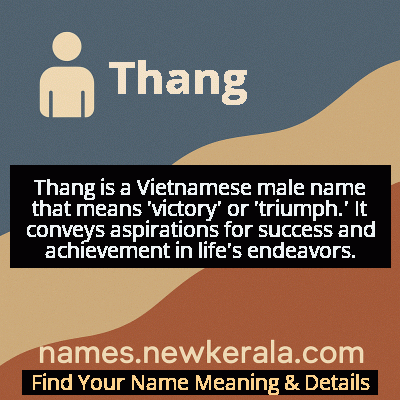Thang Name Meaning & Details
Origin, Popularity, Numerology Analysis & Name Meaning of Thang
Discover the origin, meaning, and cultural significance of the name THANG. Delve into its historical roots and explore the lasting impact it has had on communities and traditions.
Name
Thang
Gender
Male
Origin
Vietnamese
Lucky Number
5
Meaning of the Name - Thang
Thang is a Vietnamese male name that means 'victory' or 'triumph.' It conveys aspirations for success and achievement in life's endeavors.
Thang - Complete Numerology Analysis
Your Numerology Number
Based on Pythagorean Numerology System
Ruling Planet
Mercury
Positive Nature
Adventurous, dynamic, curious, and social.
Negative Traits
Restless, impatient, inconsistent, prone to indulgence.
Lucky Colours
Green, white.
Lucky Days
Wednesday.
Lucky Stones
Emerald.
Harmony Numbers
1, 3, 9.
Best Suited Professions
Sales, marketing, travel, entertainment.
What People Like About You
Versatility, charisma, adventurous spirit.
Famous People Named Thang
Lê Thánh Tông
Emperor
Expanded Vietnamese territory and implemented significant administrative reforms in the 15th century
Nguyễn Thắng
Martial Artist
Renowned Vovinam master who helped spread Vietnamese martial arts internationally
Trần Văn Thắng
Diplomat
Vietnamese ambassador known for strengthening international relations and economic partnerships
Phạm Nhật Thắng
Businessman
Successful tech entrepreneur who founded multiple innovative startups in Vietnam
Name Variations & International Equivalents
Click on blue names to explore their detailed meanings. Gray names with will be available soon.
Cultural & Historical Significance
In traditional Vietnamese culture, names are believed to influence destiny, and Thang carries the weight of expectation for achievement and honor. The name often appears in combination with other meaningful characters, creating names that express complex aspirations. During the Vietnam War era, the name gained particular popularity as families sought to express patriotic sentiments and hope for national victory. Even in modern times, it remains a powerful reminder of Vietnam's hard-won sovereignty and the enduring value placed on perseverance and ultimate success.
Extended Personality Analysis
Individuals named Thang are typically perceived as determined, ambitious, and resilient personalities who approach life with a competitive spirit and strong will to succeed. They often exhibit natural leadership qualities, combined with strategic thinking that helps them navigate challenges effectively. Their name's meaning of 'victory' seems to manifest in their persistent nature—they rarely give up easily and tend to view obstacles as temporary setbacks rather than permanent barriers.
Socially, Thangs are often charismatic and inspiring to others, able to motivate people toward common goals. They typically value honor and achievement, striving to make their families proud through their accomplishments. While they can be intensely focused on their objectives, they also tend to develop strong loyalty to friends and community. Their competitive nature is usually balanced by a sense of fairness and respect for worthy opponents, making them respected figures in both professional and personal circles.
Modern Usage & Popularity
In contemporary Vietnam, Thang remains a popular masculine name, though its usage patterns have evolved. While traditionally very common in the 20th century, particularly during wartime periods, it now maintains steady popularity as parents continue to value its powerful meaning. The name appears across all regions of Vietnam and among overseas Vietnamese communities, where it serves as a cultural anchor. Modern parents often choose Thang to express hopes for their sons' academic and professional success in an increasingly competitive global environment. While not among the top 10 most popular names today, it maintains respectable usage rates and carries a classic, respected quality that appeals to both traditional and modern families.
Symbolic & Spiritual Meanings
Beyond its literal meaning of victory, Thang symbolizes the triumph of perseverance over adversity, the reward of sustained effort, and the achievement of hard-won goals. It represents the Vietnamese cultural ideal of 'thắng không kiêu, bại không nản' (in victory, not arrogant; in defeat, not discouraged). The name carries connotations of honor earned through legitimate struggle rather than easy success, reflecting the value placed on moral character alongside achievement. Symbolically, it connects to themes of sunrise after darkness, harvest after cultivation, and resolution after conflict—embodying the cyclical nature of struggle and reward that characterizes much of Vietnamese philosophy and historical experience.

